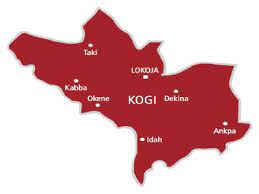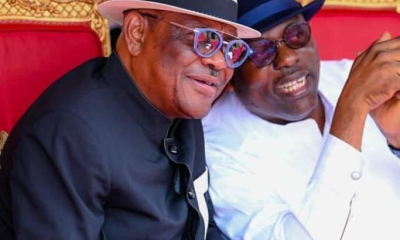BUSINESS
Markets Reopens, Normalcy Returns in Bagana after Communal Clashes

From Joseph Amedu, Lokoja
Relief has come the way of embattled people of Bagana Community in Omala Local Government Area of Kogi State as the colonel Babanawa-led peace committee has reopened the market which was closed down for over five months in the wake of the lingering bloodshed in the area.
The people of Bagana and its environs, were full of joy when the committee visited the deserted community recently to instill confidence and restore hope in the people who have been displayed from their homes for several months.
The people were estatic when the news of reopening of the market spread in the community.
Speaking with our correspondent, a member of the committee as well as that of Igala Cultural Development Association ICDA and Chairman, Kogi State Council of Nigeria Medical Association Dr.
Omakoji Oyigu called on the warring factions to sheath their swords and embrace peace through the widow opened by the committee.Oyigu noted with sadness the level of destruction and human casualty caused by the imbroglio, which has brought about huge humanitarian crisis not to only Bagana community but to the entire LGA,
He pointed out that Bagana being the trading and economic hub of the LGA should not be allowed to continue with the senseless and madness killings and destruction of property, hence, the constitution of the committee.
He added that, after careful and meticulous study of the situation, the committee decided to open the market as preliminary measure to reduce the economic hardship on the people.
He assured the people that security architecture have been mobilised to keep vigil on the town and its environs so as to give confidence to the people to return home.
Dr. Oyigu, said the Committee has in the interim, directed the the gagos of Hausa, Igala, Ihankpe and Otutubatu to fashion out all inclusive vigilante organisation that will take care of the security of the town, while the men of the Nigerian Navy will reinforce with the local vigilante on market day to provide security to lives and property.
He called on sons and daughters of the communities to avail the committee with useful memorandum that will assist in bring permanent peace to the area.
He solicited the cooperation of all those affected and infected by the 8th year old crisis to put the ugly event behind and appreciate peace to move the area forward.
It could be recalled that the Chairman of Omala Local Government Council Hon. Ibrahim Aboh, recently constituted Col. Suleiman Babanawa Committee to provide solutions to the Bagana crisis, who hit the ground running with the opening of the commodity market in Bagana.
BUSINESS
FG Pushes for Modern Equipment to Boost Manufacturing

The Federal Government has said that Nigeria must transition from importing used industrial scrap to deploying world-class, resilient manufacturing solutions as part of efforts to reposition the sector for global competitiveness.
The Minister of State for Industry, Sen.
John Enoh, stated this on Wednesday during the 2025 edition of the Nigeria Manufacturing and Equipment/Nigerian Raw Materials Expo held in Lagos.Enoh declared that Nigeria could not continue to rely on outdated and imported equipment if it hopes to achieve true industrial sovereignty.
He said, “We must move from importing used, you know, industrial scrap, because most of them, that’s what they are, to deploying world-class solutions built for resilience, for sustainability.
”The minister noted that manufacturing currently contributes less than 10 per cent to Nigeria’s Gross Domestic Product and that the government is working to reverse the trend by prioritising domestic production and adding value to local raw materials.
He added that the government was finalising a Draft National Industrial Policy, which would place technology adoption, equipment financing, and power integration at the core of manufacturing innovation.
The industry minister noted that the policy is also aligned with President Bola Tinubu’s Renewed Hope Agenda, particularly the goal of diversifying Nigeria’s economy across key sub-sectors, including textiles, automotive, and agro-processing.
Enoh commended the Manufacturers Association of Nigeria, the Raw Materials Research and Development Council, and other stakeholders for working collaboratively to develop a “fit-for-purpose” policy framework.
He explained that through the planned Made-in-Nigeria campaign, likely to be anchored by the Pro-Nigeria Secretariat, the Federal Government would support certification, digital marketplaces, and media visibility for locally produced equipment and innovations.
The Minister also revealed that the government is harmonising efforts across ministries and agencies such as the Bank of Industry, the Nigeria Export Processing Zones Authority, the Nigeria Industrial Policy Council, and the National Agency for Science and Engineering Infrastructure.
He urged Nigerian manufacturers and innovators to see the Expo not just as a marketplace but as a mandate to forge strategic technology transfer partnerships and explore modular, mobile, and decentralised equipment models for underserved regions.
He also urged the stakeholders to collaborate with tertiary institutions to co-design Nigeria-specific machines and define sustainability as industrial sovereignty and inclusive economic development.
President of the MAN, Francis Meshioye, in his remarks, described the expo as an opportunity to transform intentions into innovation and enhance Nigeria’s industrial competitiveness.
He said, “We embarked on a remarkable journey, not just about showcasing capabilities, but about exploring partnerships, innovation, and sustainable practices that can propel our industry to prosperity.”
Meshioye commended participants for their enthusiasm and urged stakeholders to reflect on how insights from the event could reshape business strategies.
“The theme of this year’s expo, ‘Accelerating Sustainable Manufacturing Through Cutting-Edge Equipment and Technology Solutions’, strongly resonates with our industry’s needs,” he said.
He added, “We must make manufacturing desirable, attractive, and a household name.”
Highlights of the day included panel discussions on sustainable innovation and technology transfer in manufacturing, the growth mindset of women in manufacturing and leveraging international partnerships.
The panellists included the Consul General of India in Lagos, Chandramouli Kern; Chief Executive Officer of PROPAK, George Pearson; Senior Trade Consultant (West Africa), VDMA, Kayode Jegede; and CEO of Open Access Data Centres, Dr Ayotunde Coker, among others.
The three-day expo brought together key government agencies, private sector players, equipment manufacturers, innovation hubs, and academia to deliberate on strategies to deepen local production capacity, reduce reliance on foreign inputs, and build an inclusive, sustainable industrial future.
BUSINESS
Toyota Cuts Profit Forecast Due to US Tariffs

Japanese auto giant Toyota on Thursday cut its annual net profit forecast to 2.66 trillion yen ($18.06 billion) owing to the impact of US tariffs.
“Due to the impact of US tariffs and other factors, actual results showed decreased operating income, and the forecast has been revised downward,” the company said in a statement.
Its shares fell 0. 6 percent in Tokyo afternoon trade.The Trump administration in April imposed a 25 percent levy on Japanese cars imported into the United States, dealing a hefty blow to Japan and its crucial auto sector.
Although Tokyo and Washington announced a trade deal in July, lowering that rate to 15 percent and providing a degree of relief for the industry, it’s not yet clear when it will take effect.
There is also confusion over whether the car tariff — as well as other “reciprocal” levies — will be capped at 15 percent, or if these would come on top of those in place before Trump’s trade blitz.
The auto industry had a pre-existing 2.5 percent tariff, meaning the levy currently stands at 27.5 percent.
Revenues in Toyota’s first quarter from April to June were up 3.5 percent, but net income dropped by 36 percent.
BUSINESS
Dangote Bags ‘Cement Company of the Year’ Award At Africa Housing Show

Africa’s largest cement manufacturing company, the Dangote Cement Plc, has added to its numerous accolades as it received the ‘Cement Company of the Year’ award at the just concluded Africa International Housing Show (AIHS) in Abuja.
The Dangote Cement Plc is one of the sponsors of the four-day housing exhibition that ended last Friday, where 21 countries and about 40,000 exhibitors.
participated.Presenting the award on behalf of the organizers of the show, Governor of Sokoto State, Ahmad Aliyu Sokoto, who was represented by his Deputy, Engr. Idris Mohammed Gobir, described the Dangote cement as a household name and the pride of Africa.
According to him, the Dangote Cement has supported Nigerian economy through job creation and philanthropy, among others.
The Minister for Housing and Urban Development, Ahmad Musa Dangiwa had lauded Dangote Cement Plc for its contributions to the development of the Nigerian Economy, urging the company to join hands with government in bridging the gap of Housing deficit in the Country.
Coordinator of the Show, Bar. Festus Adebayo had said that the housing deficit in the country can be mitigated through Public Private Partnership (PPP).
He said: “Innovation and collaboration are top priorities for us, given the rapid technological advancements in housing construction, financing and system improvements.”
Bar. Adebayo said he was optimistic that the partnership with Dangote Cement Plc will help address the narrative of housing shortfall in the country.
Speaking earlier, the Director General, Nigerian Building and Road Research Institute, (NBRRI), Prof. Samson Duna, said: “Dangote cement dominates the Nigeria and West Africa markets in respect of patronage and is doing well. Dangote Cement stands for standard and quality. Thumbs up for Dangote cement”.
Speaking at the company’s Special Day, the National Sales Director, Dangote Cement Plc, Dolapo Alli, said: “Addressing housing issues requires collaboration among various stakeholders, including government agencies, private developers, non-profits, and communities. The government can adopt public-private partnerships (PPPs) to support mass housing initiatives.
“Through PPP models, the government may initiate the construction of new estates, while companies and firms in the building and construction sector can be granted tax waivers and credits to facilitate the financing of new and affordable housing developments.”
A statement from the company’s spokesman Anthony Chiejina had said that the theme of the 2025 Show: Reimagining Housing Through Innovation, Collaboration and Policy” aptly resonated with its core value.


















